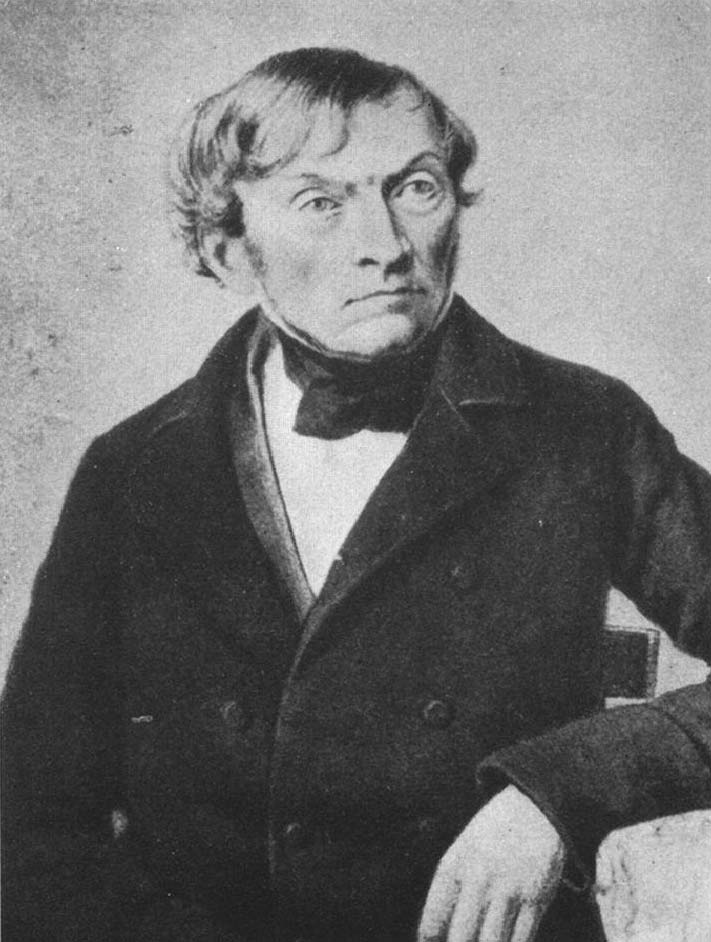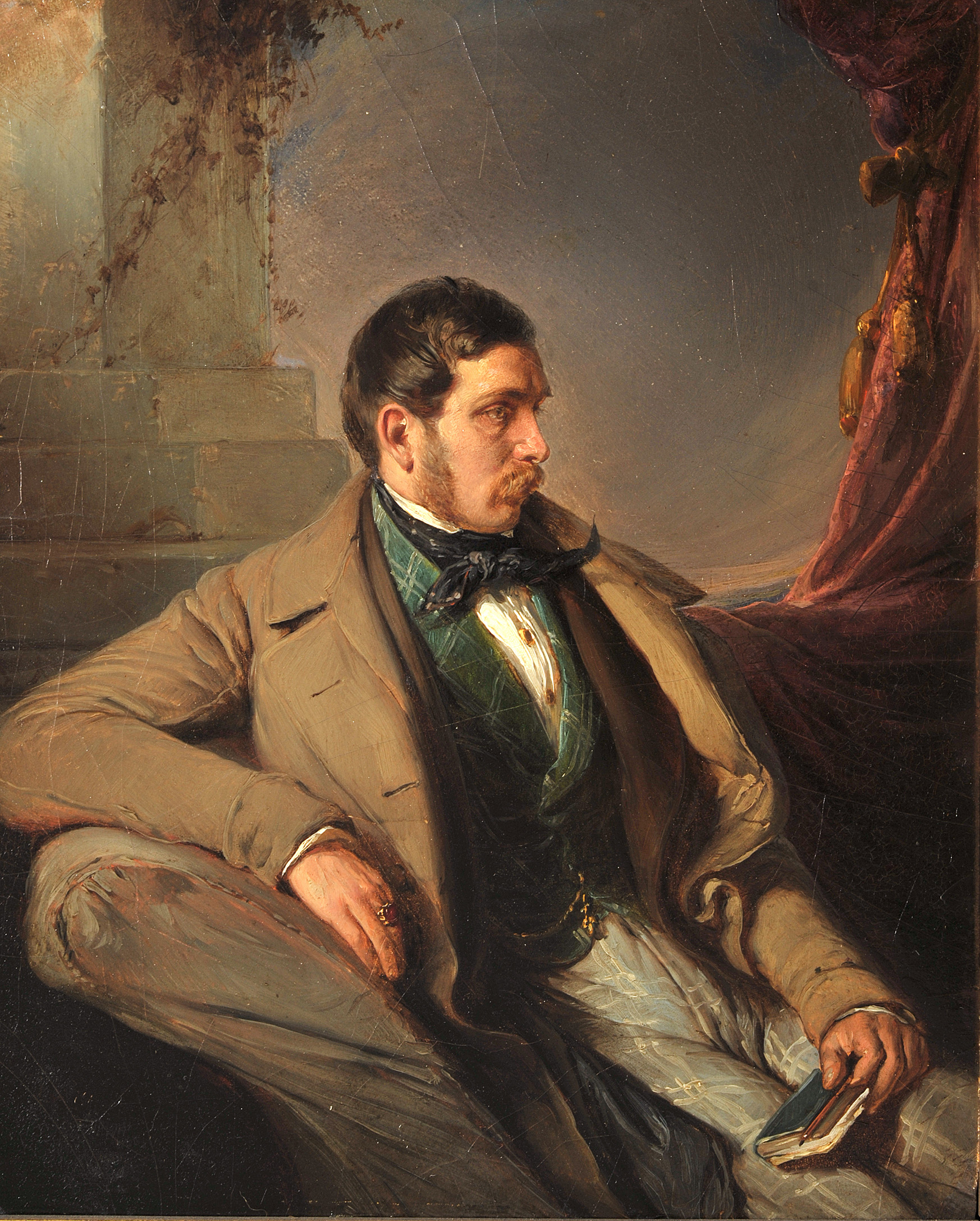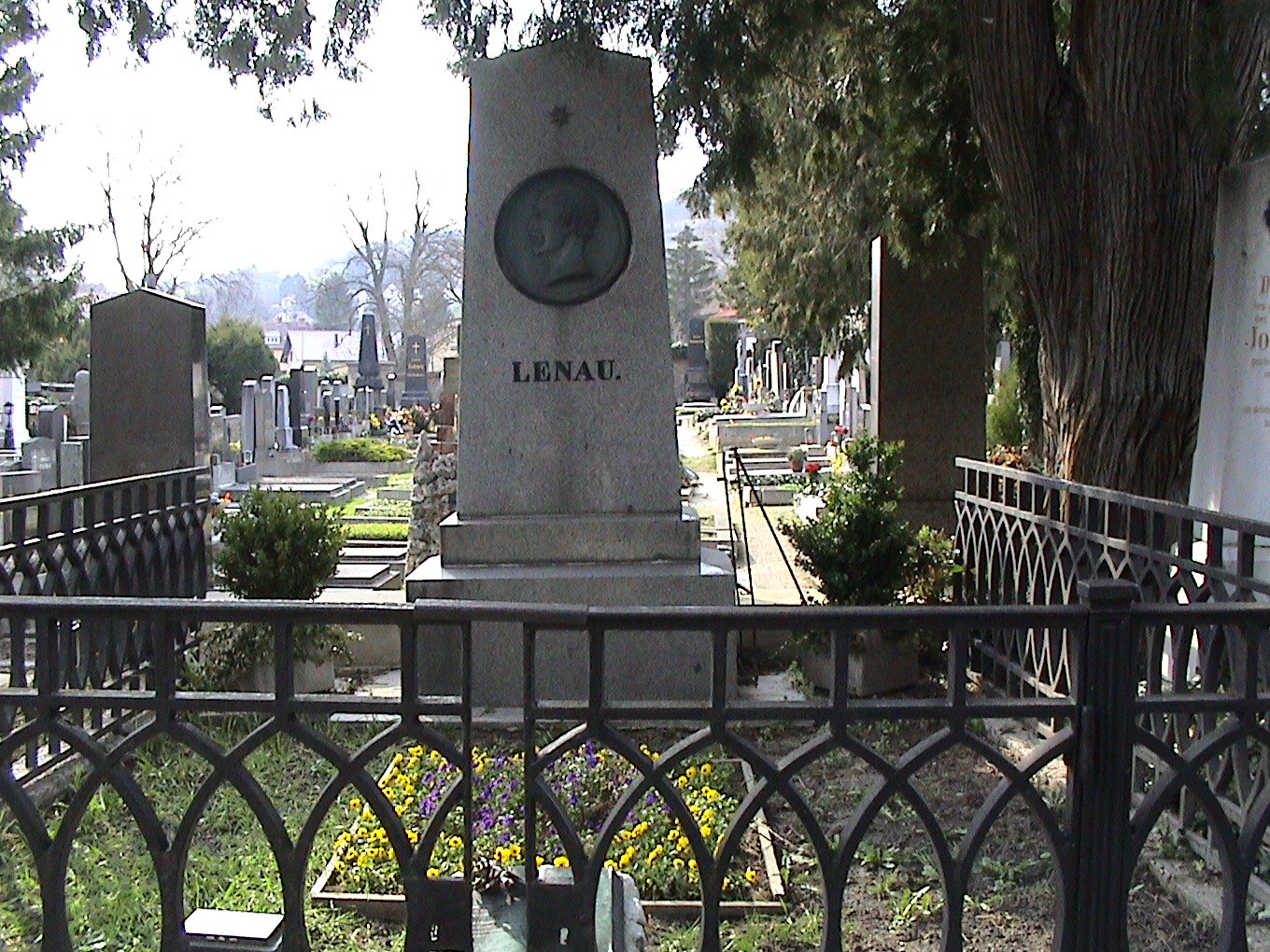|
Nicolaus Lenau
Nikolaus Lenau was the pen name of Nikolaus Franz Niembsch Edler von Strehlenau (13 August 1802 – 22 August 1850), a German-language Austrian poet. Biography He was born at Csatád (Schadat), Kingdom of Hungary, now Lenauheim, Banat, then part of the Habsburg monarchy, now in Romania. His father, a Habsburg government official, died in 1807 in Budapest, leaving his children in the care of their mother, who remarried in 1811. In 1819 Nikolaus went to the University of Vienna; he subsequently studied Hungarian law at Pozsony (Bratislava) and then spent the next four years qualifying himself in medicine. Unable to settle down to any profession, he began writing verse. The disposition to sentimental melancholy inherited from his mother, stimulated by disappointments in love and by the prevailing fashion of the romanticism, romantic school of poetry, descended into gloom after his mother's death in 1829. Soon afterwards, however, a legacy from his grandmother enabled him to devote ... [...More Info...] [...Related Items...] OR: [Wikipedia] [Google] [Baidu] |
Nikolaus Lenau
Nikolaus Lenau was the pen name of Nikolaus Franz Niembsch Edler von Strehlenau (13 August 1802 – 22 August 1850), a German-language Austrian poet. Biography He was born at Csatád (Schadat), Kingdom of Hungary, now Lenauheim, Banat, then part of the Habsburg monarchy, now in Romania. His father, a Habsburg government official, died in 1807 in Budapest, leaving his children in the care of their mother, who remarried in 1811. In 1819 Nikolaus went to the University of Vienna; he subsequently studied Hungarian law at Pozsony (Bratislava) and then spent the next four years qualifying himself in medicine. Unable to settle down to any profession, he began writing verse. The disposition to sentimental melancholy inherited from his mother, stimulated by disappointments in love and by the prevailing fashion of the romantic school of poetry, descended into gloom after his mother's death in 1829. Soon afterwards, however, a legacy from his grandmother enabled him to devote himself wh ... [...More Info...] [...Related Items...] OR: [Wikipedia] [Google] [Baidu] |
Karl Mayer (poet)
 Karl Friedrich Hartmann Mayer (22 March 1786, Neckarbischofsheim, Bischofsheim – 25 February 1870, Tübingen) was a German jurist and poet of the Swabian school of poets, the salon (gathering), circle of Justinus Kerner and the Serach poets' circle under count Alexander von Württemberg (1801–1844). His younger brother Louis Mayer (painter), Louis Mayer was a landscape painter.
1786 births
1870 deaths
People from Rhein-Neckar-Kreis
German poets
German male poets
German-language poets
Writers from Baden-Württemberg
{{Germany-poet-stub ...
Karl Friedrich Hartmann Mayer (22 March 1786, Neckarbischofsheim, Bischofsheim – 25 February 1870, Tübingen) was a German jurist and poet of the Swabian school of poets, the salon (gathering), circle of Justinus Kerner and the Serach poets' circle under count Alexander von Württemberg (1801–1844). His younger brother Louis Mayer (painter), Louis Mayer was a landscape painter.
1786 births
1870 deaths
People from Rhein-Neckar-Kreis
German poets
German male poets
German-language poets
Writers from Baden-Württemberg
{{Germany-poet-stub ...
[...More Info...] [...Related Items...] OR: [Wikipedia] [Google] [Baidu] |
Lord Byron
George Gordon Byron, 6th Baron Byron (22 January 1788 – 19 April 1824), known simply as Lord Byron, was an English romantic poet and Peerage of the United Kingdom, peer. He was one of the leading figures of the Romantic movement, and has been regarded as among the greatest of English poets. Among his best-known works are the lengthy Narrative poem, narratives ''Don Juan (poem), Don Juan'' and ''Childe Harold's Pilgrimage''; many of his shorter lyrics in ''Hebrew Melodies'' also became popular. Byron was educated at Trinity College, Cambridge, later traveling extensively across Europe to places such as Italy, where he lived for seven years in Venice, Ravenna, and Pisa after he was forced to flee England due to lynching threats. During his stay in Italy, he frequently visited his friend and fellow poet Percy Bysshe Shelley. Later in life Byron joined the Greek War of Independence fighting the Ottoman Empire and died leading a campaign during that war, for which Greeks rev ... [...More Info...] [...Related Items...] OR: [Wikipedia] [Google] [Baidu] |
Weltschmerz
(; literally "world-pain") is a literary concept describing the feeling experienced by an individual who believes that reality can never satisfy the expectations of the mind, resulting in "a mood of weariness or sadness about life arising from the acute awareness of evil and suffering". The term was coined by the German Romantic author Jean Paul in his 1827 novel ''Selina'', and in its original definition in the ' by the Brothers Grimm, it denotes a deep sadness about the insufficiency of the world (). The translation can differ depending on context; in reference to the self it can mean "world-weariness", while in reference to the world it can mean "the pain of the world". The worldview of ''Weltschmerz'' has been retroactively seen as widespread among Romantic and decadent authors such as Jean Paul, the Marquis de Sade, Lord Byron, Giacomo Leopardi, William Blake, Charles Baudelaire, Paul Verlaine, François-René de Chateaubriand, Oscar Wilde, Alfred de Musset, Mikhail Lerm ... [...More Info...] [...Related Items...] OR: [Wikipedia] [Google] [Baidu] |
Epic Poetry
An epic poem, or simply an epic, is a lengthy narrative poem typically about the extraordinary deeds of extraordinary characters who, in dealings with gods or other superhuman forces, gave shape to the mortal universe for their descendants. Etymology The English word ''epic'' comes from Latin ''epicus'', which itself comes from the Ancient Greek adjective (''epikos''), from (''epos''), "word, story, poem." In ancient Greek, 'epic' could refer to all poetry in dactylic hexameter (''epea''), which included not only Homer but also the wisdom poetry of Hesiod, the utterances of the Delphic oracle, and the strange theological verses attributed to Orpheus. Later tradition, however, has restricted the term 'epic' to ''heroic epic'', as described in this article. Overview Originating before the invention of writing, primary epics, such as those of Homer, were composed by bards who used complex rhetorical and metrical schemes by which they could memorize the epic as received i ... [...More Info...] [...Related Items...] OR: [Wikipedia] [Google] [Baidu] |
Danube
The Danube ( ; ) is a river that was once a long-standing frontier of the Roman Empire and today connects 10 European countries, running through their territories or being a border. Originating in Germany, the Danube flows southeast for , passing through or bordering Austria, Slovakia, Hungary, Croatia, Serbia, Romania, Bulgaria, Moldova, and Ukraine before draining into the Black Sea. Its drainage basin extends into nine more countries. The largest cities on the river are Vienna, Budapest, Belgrade and Bratislava, all of which are the capitals of their respective countries; the Danube passes through four capital cities, more than any other river in the world. Five more capital cities lie in the Danube's basin: Bucharest, Sofia, Zagreb, Ljubljana and Sarajevo. The fourth-largest city in its basin is Munich, the capital of Bavaria, standing on the Isar River. The Danube is the second-longest river in Europe, after the Volga in Russia. It flows through much of Central and Sou ... [...More Info...] [...Related Items...] OR: [Wikipedia] [Google] [Baidu] |
Stockerau
Stockerau () is a town in the district of Korneuburg (district), Korneuburg in Lower Austria, Austria. Stockerau has 15,921 inhabitants, which makes it the largest town in the Weinviertel.https://statistik.at/wcm/idc/idcplg?IdcService=GET_PDF_FILE&RevisionSelectionMethod=LatestReleased&dDocName=103418 Stockerau is also called "Lenaustadt" (Lenau Town) because the Austrian poet Nikolaus Lenau often spent time with his grandparents here. Population Amenities Leisure facilities are various: wellness centre, sports centre with three gyms, judo and table tennis gym, skittle alley and football stadium. In addition there are indoor and outdoor tennis facilities. Stockerau offers a range of exhibitions, concerts, readings and singing evenings in the cultural centre "Belvedereschlößl". In the cellar of this castle, built in 16th century and revitalised by the town community in the year 1984, you will find the district museum. Between Stockerau and the Danube there is a large forest ... [...More Info...] [...Related Items...] OR: [Wikipedia] [Google] [Baidu] |
Klosterneuburg
Klosterneuburg (; frequently abbreviated as Kloburg by locals) is a town in Tulln District in the Austrian state of Lower Austria. It has a population of about 27,500. The Klosterneuburg Monastery, which was established in 1114 and soon after given to the Augustinians, is of particular historical importance. Geography It is located on the Danube, immediately north of the Austrian capital Vienna, from which it is separated by the Kahlenberg and Leopoldsberg hills of the Vienna Woods range. It has been separated from its twin city of Korneuburg on the left bank of the Danube since the river changed its course during the Late Middle Ages. The towns are connected by a reaction ferry link. The municipal area comprises the northern tip of the Donauinsel as well as the high Mt. Exelberg and its telecommunication tower. At the site of a former pioneer school of the Austrian Bundesheer, Klosterneuburg has various military buildings and former stores which will be developed into a 12 hec ... [...More Info...] [...Related Items...] OR: [Wikipedia] [Google] [Baidu] |
Don Juan
Don Juan (), also known as Don Giovanni (Italian), is a legendary, fictional Spanish libertine who devotes his life to seducing women. Famous versions of the story include a 17th-century play, '' El burlador de Sevilla y convidado de piedra'' (''The Trickster of Seville and the Stone Guest'') by Tirso de Molina, a 1787 opera, ''Don Giovanni'', with music by Mozart and a libretto by Lorenzo da Ponte, and a satirical, epic poem, ''Don Juan'', by Lord Byron. By linguistic extension, from the name of the character, "Don Juan" has become a generic expression for a womanizer, and stemming from this, Don Juanism is a non-clinical psychiatric descriptor. Pronunciation In Spanish, is pronounced . The usual English pronunciation is , with two syllables and a silent " J", but today, as more English-speakers have notions of Spanish, the pronunciation is becoming more common. However, in Lord Byron's verse version the name rhymes with ''ruin'' and ''true one'', suggesting the name was ... [...More Info...] [...Related Items...] OR: [Wikipedia] [Google] [Baidu] |
Faust
Faust is the protagonist of a classic German legend based on the historical Johann Georg Faust ( 1480–1540). The erudite Faust is highly successful yet dissatisfied with his life, which leads him to make a pact with the Devil at a crossroads, exchanging his soul for unlimited knowledge and worldly pleasures. The Faust legend has been the basis for many literary, artistic, cinematic, and musical works that have reinterpreted it through the ages. "Faust" and the adjective "Faustian" imply sacrificing spiritual values for power, knowledge, or material gain. The Faust of early books—as well as the ballads, dramas, movies, and puppet-plays which grew out of them—is irrevocably damned because he prefers human knowledge over divine knowledge: "he laid the Holy Scriptures behind the door and under the bench, refused to be called doctor of theology, but preferred to be styled doctor of medicine". Plays and comic puppet theatre loosely based on this legend were popular throughout ... [...More Info...] [...Related Items...] OR: [Wikipedia] [Google] [Baidu] |
Vienna
en, Viennese , iso_code = AT-9 , registration_plate = W , postal_code_type = Postal code , postal_code = , timezone = CET , utc_offset = +1 , timezone_DST = CEST , utc_offset_DST = +2 , blank_name = Vehicle registration , blank_info = W , blank1_name = GDP , blank1_info = € 96.5 billion (2020) , blank2_name = GDP per capita , blank2_info = € 50,400 (2020) , blank_name_sec1 = HDI (2019) , blank_info_sec1 = 0.947 · 1st of 9 , blank3_name = Seats in the Federal Council , blank3_info = , blank_name_sec2 = GeoTLD , blank_info_sec2 = .wien , website = , footnotes = , image_blank_emblem = Wien logo.svg , blank_emblem_size = Vienna ( ; german: Wien ; ba ... [...More Info...] [...Related Items...] OR: [Wikipedia] [Google] [Baidu] |
Harmony Society
The Harmony Society was a Christian theosophy and pietist society founded in Iptingen, Germany, in . Due to religious persecution by the Lutheran Church and the government in Württemberg, the group moved to the United States,Robert Paul Sutton, ''Communal Utopias and the American Experience: Religious Communities'' (Westport, CT: Praeger, 2004) p. 38. where representatives initially purchased land in Butler County, Pennsylvania. On February 15, 1805, the group of approximately 400 followers formally organized the Harmony Society, placing all their goods in common. Under its founder and spiritual leader, Johann Georg Rapp (1757–1847); Frederick (Reichert) Rapp (1775–1834), his adopted son who managed its business affairs; and their associates, the Society existed for one hundred years, roughly from 1805 until 1905. Members were known as Harmonists, Harmonites, or Rappites. The Society is best known for its worldly successes, most notably the establishment of three model c ... [...More Info...] [...Related Items...] OR: [Wikipedia] [Google] [Baidu] |


%2C_Foto_von_Friedrich_Brandseph.jpg)





